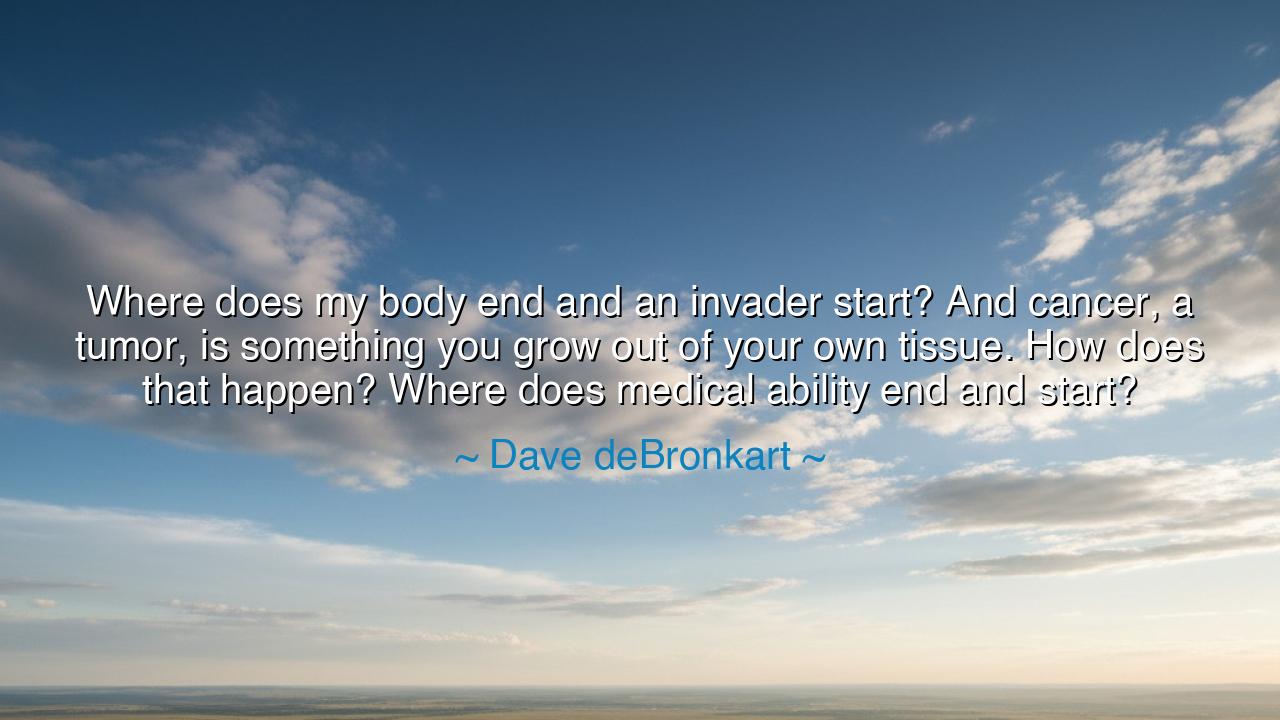
Where does my body end and an invader start? And cancer, a tumor
Where does my body end and an invader start? And cancer, a tumor, is something you grow out of your own tissue. How does that happen? Where does medical ability end and start?






When the voice of Dave deBronkart, known as e-Patient Dave, spoke the words: “Where does my body end and an invader start? And cancer, a tumor, is something you grow out of your own tissue. How does that happen? Where does medical ability end and start?” he did not speak merely as one afflicted with illness, but as one who gazed into the very abyss of human existence. His questions are the questions of all mortals: what is the boundary between the self and the foreign, between life and the enemy within, between the limits of healing and the mystery of fate? These words resound as the lament and the wonder of the human condition itself.
For the ancients taught that the body is a temple, fashioned with care by unseen hands, yet vulnerable to storms that rise from both without and within. The invader once was thought to be demons, or humors out of balance, or arrows of fate sent by capricious gods. But in our time, science has revealed that the greatest invader may not always be foreign, but may spring from our very own tissue, as though the temple rebels against itself. This is the cruel paradox of cancer: it is not an outsider, but a distorted child of the body’s own creation. Thus deBronkart’s words echo with a grief as old as Job’s cry, “Why is light given to those in misery?” For what greater confusion is there than to be attacked by that which is your own flesh?
The story of Hippocrates, father of medicine, shows us that even in ancient days men struggled with the mystery of the body’s betrayal. He sought to discern where the physician’s ability ended and the divine hand began. Though his tools were crude compared to ours, he knew that there is a threshold beyond which human craft cannot cross. To this day, healers walk this same border: they cut, they poison, they burn — and yet the question remains, do they command life, or only plead with it? DeBronkart gives voice to that eternal uncertainty: where does medical ability end, and where does the unknowable begin?
We may also remember the tale of Emperor Hadrian of Rome, who, stricken with illness in his later years, lamented to his own soul: animula vagula blandula, “little wandering soul, where will you go?” He ruled over nations but could not rule over the rebellion within his own frame. Even emperors face the same mystery as the common man: the body turns against itself, and no legions, no gold, no earthly power can draw the line between self and invader.
DeBronkart’s words, however, are not merely cries of despair. They are also torches of inquiry. For to ask such questions is to sharpen the sword of knowledge. It is curiosity, fierce and relentless, that drives the progress of healing. The boundaries between body and invader, between tissue and tumor, between the physician’s art and the mysteries of fate — these are not fixed walls but moving frontiers. Each question pushes the line forward, turning despair into discovery.
The lesson for us is profound: we must accept both the strength and the limits of our craft. We must honor the healers, who strive to extend the dominion of medical ability, yet we must also walk in humility, knowing that some mysteries remain. In this humility is not defeat, but reverence — reverence for life, for the unknown, for the fragility and the resilience of the human body.
Practical action lies in living as e-patients, partners in our own survival. Seek knowledge of your illness, question boldly, share openly, and do not abandon your agency to the silence of ignorance. At the same time, cherish your body daily, for it is both the battlefield and the warrior in the fight for your life. Nourish it, listen to it, and walk with gratitude, for every moment of health is a gift neither wholly explained nor fully deserved.
Thus, let these words remain as a torch for generations: the body is both fortress and foe, the invader is sometimes born of our own tissue, and medical ability is a noble yet finite force. We, who inherit both wisdom and frailty, must walk the path of courage, asking questions, seeking balance, and living fully in the face of mystery. This is the teaching of deBronkart’s cry — to embrace the uncertainty not with fear, but with the fire of inquiry and the dignity of hope.






AAdministratorAdministrator
Welcome, honored guests. Please leave a comment, we will respond soon